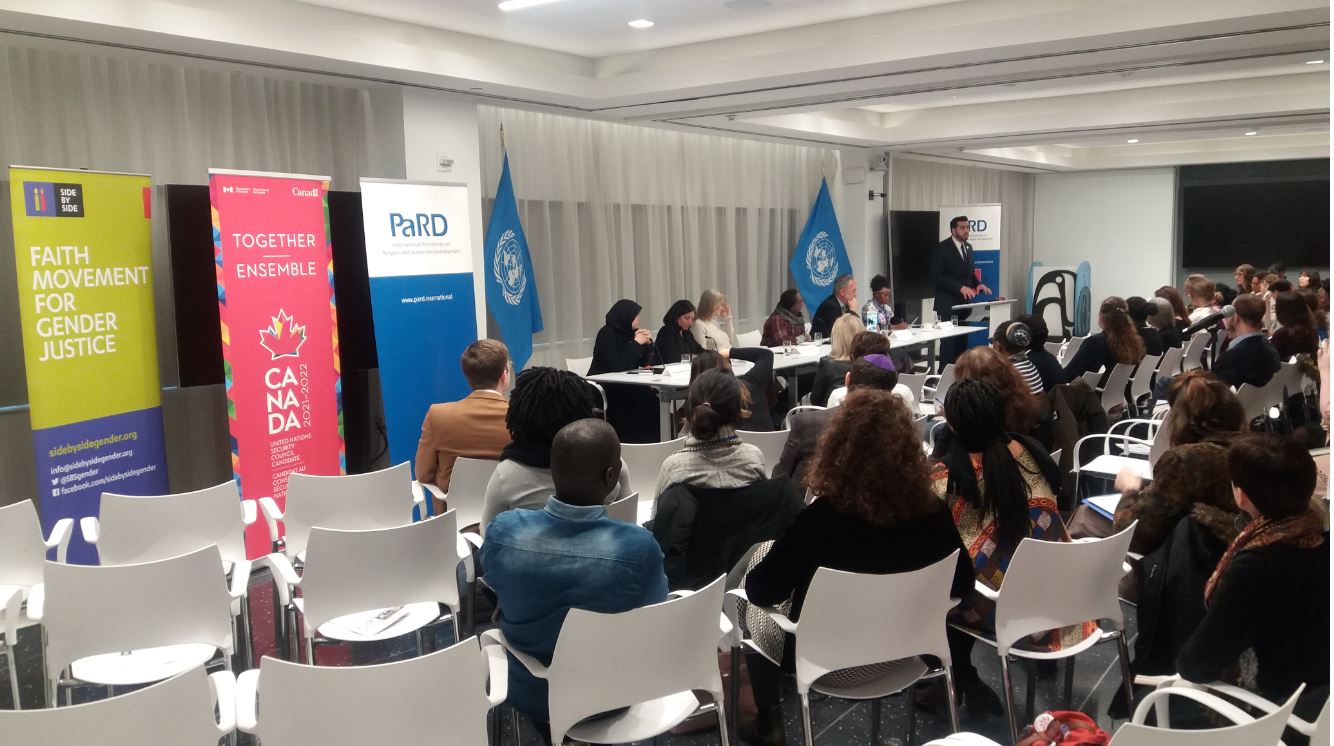Faith, Feminism and Human Rights Frameworks
Date of Meeting: 15 March 2019
Meeting Organizer: PARD – International Partnership on Religion and Sustainable Development
ISJC Staff Present: Captain Paula Mendes
Reporter: Captain Paula Mendes
Which SDG does this topic cover? SDGs 5
Type of meeting: Panel Presentation with Questions and Answers
Brief summary of presentation of information made
The event was in the Permanent Mission of Canada to the United Nations and the opening remarks were made by a representative of the Canadian Government. The moderator was
Kirsten Muth, the Special Advisor for the Episcopal Relief and Development, and the panelists were:
- Bani Dugal, Principal Representative of the Bahá’í International Community to the United Nations
- Revd. Fedis Nyagah, Programme Coordinator, Council of Anglican Provinces in Africa
- Ulrich Nitschke, Head of Secretariat, International Partnership on Religion and Sustainable Development
- Shaykha Tamara Gray, Founder and Executive Director, Rabata
- Josephine Mukwendi, MenEngage Africa Training and Youth Coordinator, Sonke Gender Justice
Highlights:
- 84% of the world’s population self-identify as members of a faith group. Therefore, there is an urge to rethink about the role of religion
- Religion can sometimes encourage gender inequalities
- We need to recognise that it’s a complex relationship between feminism and religion, especially in the three largest religions (Christianity, Hinduism, Islam)
- There is remarkable absence of women in positions of power (among Catholics, for example, there are no female priests).
- Jesus himself challenged the structures of masculinity.
- There is an urge to rediscover the roles of theological reflection and feminist theology
- We need positive roles for masculinity.
- Religion is sometimes used to perpetuate some practices that are harmful, especially to legitimize gender-based violence.
- There are some cultural differences in defining what it means to be a man. So, we need to relearn our own religious traditions.
- At the UN, for example, we mostly see men talking about the SDGs.
- We need to challenge the patriarchal structures and we can do this by combining efforts, forming new interpretations on what it means to be masculine and feminine and how to form new structures.
- Woman in leadership are not absent. They are just not seen. There are many women fighting for feminism, but without carrying the label.
- We need to carry the label of feminism so this 84% of the population who sees itself as religious cannot say that their religion is anti-women.
- It’s essential to have an inter-faith education. We need to learn to respect each other and especially support women in leadership among different religions.
- We need to choose wisely the kind of language we use, because it can have a positive or negative effect.
- Sometimes religious leaders are guardians of information that could be useful for people.
- Some leaders say no to certain subjects out of ignorance.
- We need to create spaces for discussion, because if we don’t do that, we will fail as religiously affiliated organisations and as government.
What was of particular significance to share with The Salvation Army globally?
In the light of what was presented, and as a faith-based organisation, and also as human rights supporters we need to:
- Find ways to challenge some of our traditional practices within The Salvation Army related to gender
- Find ways to think about the structure of The Salvation Army with a recognition that we do not have many women in decision making, leadership roles
- Create more space to talk about feminism in our religious spheres
- Engage in inter-faith dialogue and support initiatives to fight gender-based violence and other cultural practices against women, such as genital mutilation, child marriage etc and share with others within The Salvation Army the importance of these issues.
Web links for more information
http://www.partner-religion-development.org/
Tags: SDG5: Gender Equality